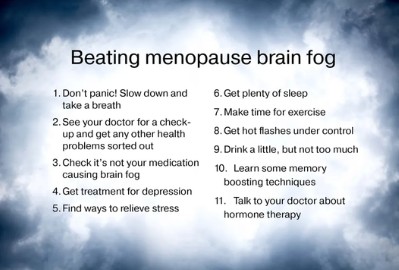Menopause and Mind Fog! Ever walk into a room and completely forget why you went there? Or find yourself mid-sentence, the perfect word just… vanished? If you’re navigating the rollercoaster of perimenopause or menopause, chances are you’re nodding vigorously while simultaneously trying to remember where you put your glasses (which are likely on your head).
Welcome, my friend, to the wonderfully frustrating world of menopause mind fog.
It’s real. It’s annoying. And no, you’re not imagining it or suddenly developing early-onset dementia. You’re experiencing a very common and very normal symptom of hormonal change.

So, What Is This “Mind Fog” Really?
Think of it like your brain is running on dial-up internet when it used to be broadband. Or trying to find a specific book in a library where someone’s randomly rearranged a few shelves. It’s not that the information isn’t there, it’s just harder to access, slower to retrieve, and sometimes feels a bit… hazy.
Common “mind fog” symptoms include:
- Difficulty concentrating: Reading the same paragraph three times.
- Forgetfulness: Misplacing keys, forgetting appointments, drawing blanks on names.
- Word retrieval issues: That “tip of the tongue” feeling, often for common words.
- Trouble multi-tasking: Feeling overwhelmed when trying to juggle a few things at once.
- Reduced mental clarity: Feeling generally “scatterbrained” or less sharp than usual.
- Difficulty learning new things: It might just take a bit more effort.
Why Is My Brain Suddenly So… Fuzzy?
The prime suspect, as with many menopause symptoms, is our old friend estrogen.
Estrogen isn’t just about periods and hot flashes; it plays a crucial role in brain function. It influences neurotransmitters, blood flow to the brain, and even the growth and connections of brain cells. As estrogen levels fluctuate wildly during perimenopause and then decline post-menopause, it can affect:
- Memory: Especially verbal memory (remembering words, names) and working memory (holding information in your mind temporarily).
- Attention and Focus: Making it harder to concentrate.
- Processing Speed: Things just feel a bit slower.
But it’s not just estrogen. This mind fog often gets a helping hand from some of its less-than-helpful buddies:
- Sleep Deprivation: Hot flashes and night sweats often lead to disturbed sleep, and well, a tired brain is a foggy brain for anyone!
- Increased Stress & Anxiety: The perimenopause journey itself can be stressful, and stress hormones like cortisol can impair cognitive function. It’s a vicious cycle.
- Fatigue: General fatigue, often linked to poor sleep and hormonal shifts, makes everything feel harder.
- Other Health Factors: Dehydration, poor nutrition, certain medications, or underlying health conditions can also contribute.
What Can You Do When Your Brain Feels Like a Cloud?
While you can’t magically rewind time and bring your estrogen levels back to their 20s, there’s a lot you can do to help clear the fog and support your brilliant brain:
- Prioritize Sleep (Seriously): This is non-negotiable. Aim for 7-9 hours of quality sleep. Create a relaxing bedtime routine, keep your bedroom cool, dark, and quiet, and limit screen time before bed. If night sweats are disrupting sleep, talk to your doctor.
- Move Your Body: Regular physical activity boosts blood flow to the brain, reduces stress, and improves mood – all fantastic for cognitive function. Even a daily brisk walk can make a difference.
- Nourish Your Brain: Focus on a diet rich in whole foods, healthy fats (like omega-3s from fish, nuts, seeds), antioxidants (berries, colorful veggies), and lean protein. Stay well-hydrated! Dehydration can significantly impact brain function.
- Engage Your Mind: Keep your brain active! Learn a new skill (a language, an instrument), do puzzles, read (even if it takes longer), play strategy games, or take a class. Mental stimulation is like exercise for your brain.
- Single-Task, Don’t Multi-Task: Our brains are actually pretty bad at true multi-tasking. Focus on one thing at a time to reduce overwhelm and improve concentration.
- Embrace Aid (No Shame!):
- Write it down: Use sticky notes, a planner, your phone’s calendar, or a dedicated notebook. Externalize your memory.
- Create routines: Put your keys in the same spot every time.
- Set reminders: Your phone is your friend!
- Manage Stress: Find strategies that work for you: mindfulness meditation, deep breathing exercises, yoga, spending time in nature, or engaging in hobbies you love. Stress is a major brain-drainer.
- Talk to Your Doctor: If the fog is severe, impacting your daily life, or accompanied by significant mood changes, don’t hesitate to consult your GP. They can rule out other causes and discuss options like Hormone Replacement Therapy (HRT), which many women find significantly improves cognitive function, hot flashes, and sleep.
- Be Kind to Yourself: This is a temporary phase, and it doesn’t mean you’re losing your intelligence or your capabilities. Give yourself grace, laugh about those “senior moments” (even if you’re not a senior!), and remind yourself that your amazing brain is simply navigating a monumental transition.
Conclusion
Menopause mind fog is a frustrating speed bump, not a roadblock. By understanding what’s happening and taking proactive steps to support your brain, you can definitely navigate this phase with more clarity and less “where did I put that thing?” moments. You’ve got this!







Leave a Reply